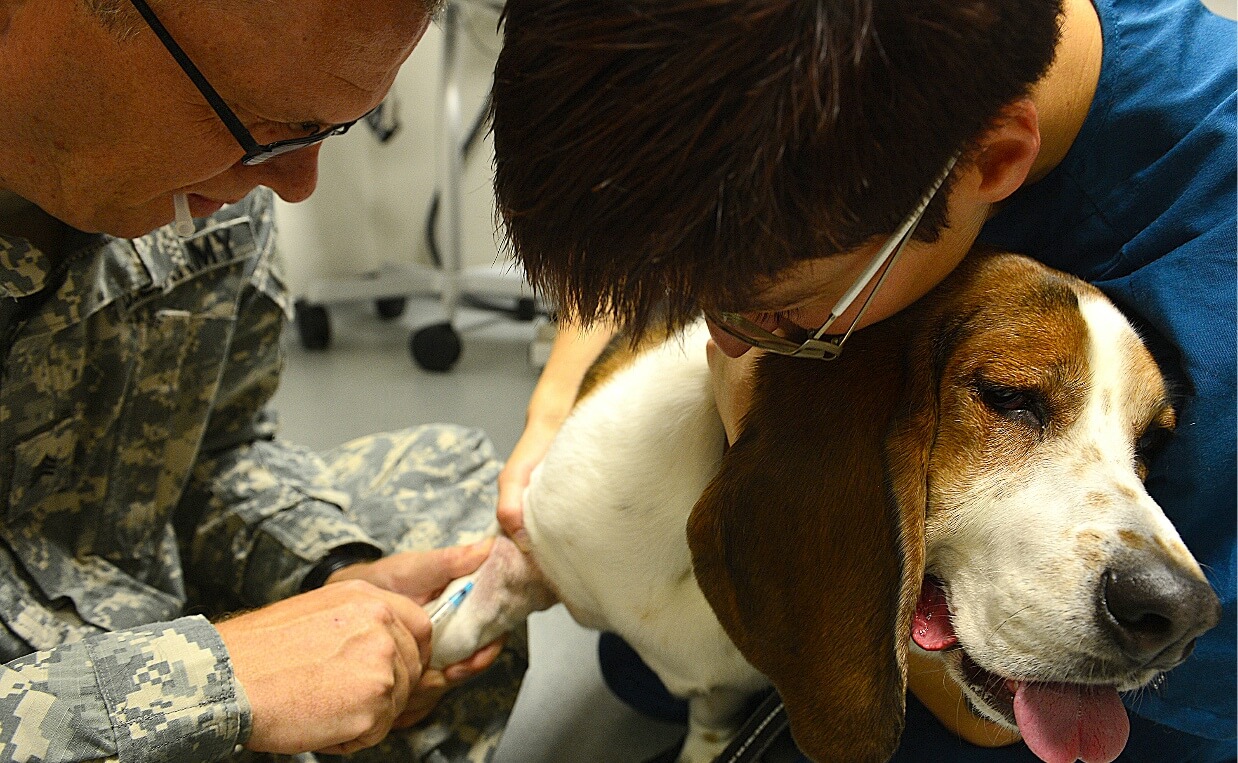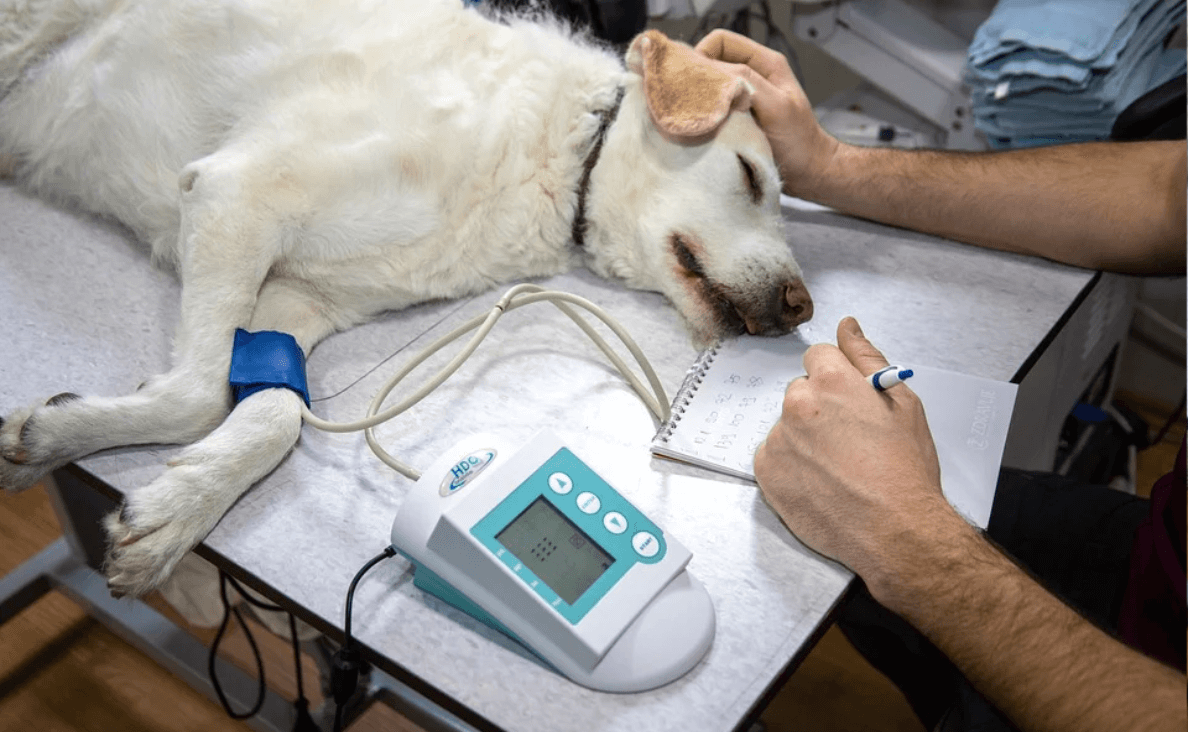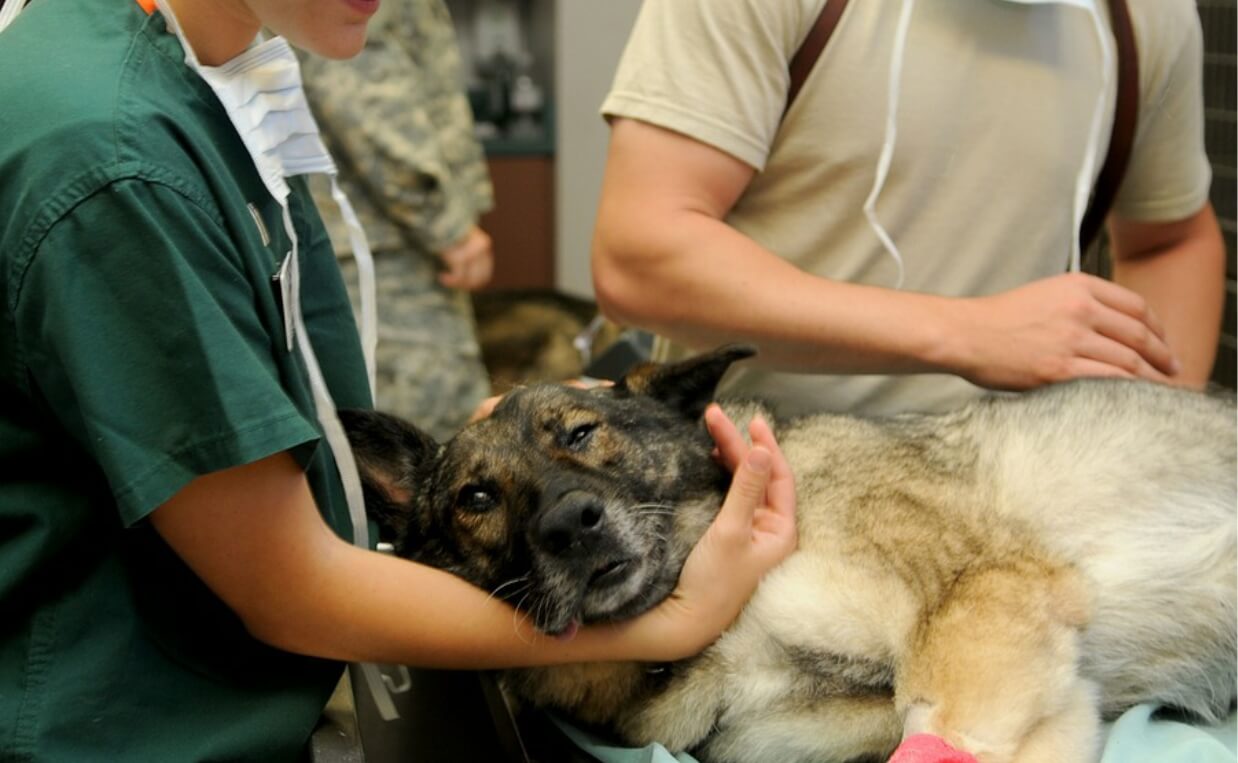
Canine anaphylaxis is a severe allergic reaction in dogs. Anaphylaxis can be serious, resulting in shock, respiratory or cardiac failure, or even death. The reaction can be localized to a specific part of the body or generalized to the entire body, shutting down the major organs.
Anaphylaxis is unpredictable because almost any substance can be the culprit. For an anaphylactic reaction to occur, the animal must have had previous exposure to the offending substance. However, most of the time the cause of anaphylaxis in dogs is not identified.
The first time an animal is exposed to the allergen a short-term, localized reaction called a humoral response will occur. However, if the dog is exposed again, an anaphylactic response is likely to occur, causing a mild or severe reaction, depending on the severity of your dog’s allergy.

If you recognize your dog is having an allergic reaction you need to seek veterinary treatment immediately. The condition can be deadly so it needs to be treated as an emergency. If treatment is given soon enough, most dogs will recover completely.
Here’s what you need to know about anaphylaxis in dogs.
Symptoms of an Anaphylactic Reaction in Dogs
Dogs will usually display digestive symptoms because the first organ to be affected by anaphylaxis is the liver. Unlike humans, dogs may not exhibit swelling in the face or throat.
These symptoms may indicate a severe allergic reaction. If your dog displays any of these symptoms seek emergency veterinary attention immediately.
- Vomiting
- Diarrhea
- Pale (bluish color) to the tongue and gums
- Cold limbs
- Excessive salivating or drooling
- Wheezing and difficulty breathing
- Increased heart rate
- Weak pulse
- Seizures
- Shock
- Coma

These symptoms may indicate a less intense reaction; veterinary attention should still be sought.
- Skin issues such as hives, swelling, bumps, rashes or itchy spots
- Congestion
- Dry, chronic cough
- Difficulty breathing during exercise
- Vomiting after eating certain foods
Causes of Anaphylaxis in Dogs
Any foreign substance can be the trigger of an allergic reaction. However, there are some common substances to look for (these are the same in humans).
- Insect bites and stings
- Food or chemicals used to prepare food
- Injections of medication or vaccines
- Other types of medication
Diagnosis of Anaphylaxis in Dogs
Anaphylaxis is diagnosed by examining the dog and looking for characteristic clinical signs. Intradermal skin testing and IgE blood tests may be ordered to identify specific allergens.

Treatment of Anaphylaxis in Dogs
An anaphylaxis reaction is a medical emergency and must be treated quickly. The first step to make sure any triggering substance – such as a bee’s stinger – is removed. Then, the pet is stabilized to prevent or minimize shock. The dog will be checked to make sure the airway is open, blood pressure is stable and blood circulation is maintained.
Intravenous intervention is almost always required. Fluids and emergency drugs, such as epinephrine, corticosteroids, atropine and/or aminophylline are often necessary. A placement of a breathing tube may be needed.
If the dog is experiencing a mild reaction, the veterinarian may administer antihistamines and possibly corticosteroids. Close monitoring will be needed for 24-48 hours.

Prognosis of Anaphylaxis
The initial prognosis of an anaphylactic reaction is always guarded. It is impossible to know how major a crisis the reaction will be.
Since anaphylaxis worsens with each event, the main goal is to prevent subsequent exposure to the offending substance. This may be difficult if the triggering substance is unknown.
If your dog has a anaphylactic episode, you will most likely be given emergency medications to have on hand and instructions on what to do if your dog shows any signs of a future reaction.
If a future event occurs you will still need to seek veterinary attention immediately, even if you’ve administered epinephrine in the form of an epi-pen.

Has your dog experienced anaphylaxis? If so, did you seek veterinary attention? How was it treated? Let us know in the comments below.

 Exercise-Induced Collapse in Dogs
Exercise-Induced Collapse in Dogs Top 10 Reasons Your Dog May Be Sick and What to Do About It
Top 10 Reasons Your Dog May Be Sick and What to Do About It 12 Ways to Help Your Dog Get Enough Exercise
12 Ways to Help Your Dog Get Enough Exercise Alternative Veterinary Care Therapies for Injured or Diseased Dogs
Alternative Veterinary Care Therapies for Injured or Diseased Dogs How to Keep Your Dog Cool During a Heatwave
How to Keep Your Dog Cool During a Heatwave






My mini dachshund did suffer an allergic reaction to a bee sting and went into anaphylactic shock. I rushed her to the vet. They gave her 2 shots in the IV one Steriid, other benadryl. Then transferred to Ezr vet had to administer ephedrine because her blood pressure was only 30. I need something for emergency before I can get to vet again. Still trying to get this. Appreciate any help. Vet said just bring her in again if it happens. I would think I should have something on hand until I can reach the vet.
Often, your local Humane Society or shelter will know the local animal resources. Try reaching out to them and see if they have any resources in your local area.
Half of a 25mg benadryl pill!
72 hrs after anaphylactic reaction to what we think was a bee sting , 8 mo old chihuahua very very lethargic. Refusing to eat or drink. Exam & blood test’s yesterday but no news from vet today. Worried about hydration & blood sugar.
I hope your pup is feeling better by now. The best thing you can do is contact your veterinarian’s office or an emergency veterinary hospital when you’re concerned about your dog’s health and well-being.
My dog a Pitbull terrier mix and what we think she was stung by a Bee on her front paw. And she was licking at it and would limp on it but then she just fell to the ground and started throwing up this sticky white substance and she had diarrhea. When we brought her in the house she wouldn’t pay attention to anything and she would let me look at her paws which she never does. But he pupils where very big and she just wouldn’t listen and we took her in the vet and they said she had a low pulse and her gums where getting pale and they took her in for an hour and we are still waiting for them to contact us but I really don’t know what to expect and I’m honestly scared . Please let me know if you know anything.
I hope your dog has recovered and is feeling fine by now. An allergic reaction to a bee sting can be serious and is very scary for pet parents. I’m glad you found the blog and I hope the information contained in it was helpful and comforting.
This exact thing happened to my Cavoodle, I rushed her to the vet and they said her colour was not good and kept her to do some tests and treat her. 3 hours later they said she was improved and the colour was back in her gums . They did blood tests and said they were normal. They treated her with an injection of Niramine. They said to watch her closely and bring her back if any symptoms return. I’ve only just picked her up so hopefully she will now be ok.
Yes, never found Stinger or swollen area. Dog collapsed with shallow breathing, inability to move. I found him in minutes & got him to vet. He was passing blood too so he was transferred to intensive care animal hospital. 48 hours, with plasma transfusions, epi, steroids, fluids, etc, he made it. I was sent home with epinephrine in case of reoccurance.
Our 2 1/2 year old black Labrador excitable and extremely athletic dog went every morning to retrieve balls. He would get exhausted after 5-10 minutes. Recovered in about 30 minutes each time and was fine. On July 24, 2023 same routine after playing with him he went inside home was found 20 minutes later vomiting and diarrhea. Rushed him to ER. No known allergies but possible insect or snake bite according to the VET. He had no signs of a bite of ant kind that we could find. According to vet he was in anaphylactic shock. They couldn’t tell us why. After 8 blood transfusions and many meds we had to say goodbye.on July 25th. He had received his annual vacations in June. When I mentioned that the Vet got angry and said that couldn’t be the cause. I just wanted answers. I didn’t know there was an issue called exercise induced collapse until reading up on issues with labradors. He was the best most healthiest dog we have ever had. I am still heart broken over him. I read there is a gene that if both parents have this there pups can have this issue with exercise. . We got him from a breeder in Lubbock. I’m not a Vet but I need to wrap my head around this loss in someway.
I’m so sorry for your loss. I hope happy memories of your beloved Labrador will bring you comfort during this difficult time.
Sad case my area doesn’t have any vet for emergency cases .. my dog’s body all swollen like being bite by insects or mosquitoes.. itchiness made it can’t sleep … what should I do?
We are unable to diagnose an animal because we are not veterinarians. If you’re unable to get a referral to a nearby emergency vet hospital, you may want to invest in a telehealth veterinary service like Pawp who may be able to help. I hope your pup is feeling better by now!
My handsome boy diesel was a boxer/pit. He was turning 9 this coming Aug. He was stung or bitten on his paw by something. We gave him Benadryl and swelling on paw went away. 7 days later he began to act disoriented and didn’t wanna go out at night. We thought his eyes were just going as due to his age. Three days he died due to what I believe was anaphylactic shock. What breaks my heart is my daughter needs a epipen and had I known that he was going through anaphylactic shock I would’ve saved his life. I’m so lost,so broken I blame myself. He died in my arms and I can’t get the picture out my head. I just hope my sweet sweet boy knows had I known what I knew now I would’ve done everything to keep him with me. After he passed I called to get a price to take his body and one place wouldn’t even tell me the price they said bring him there and if I couldn’t Afford it I’d have to take him back home and store him some place cool until I could afford it. I had the money and I went somewhere else that actually told me the price beforehand. But how dare they tell me to bring my deceased, most loyal,best friend back home until I could afford it. I make sure I try to donate to organizations when I can for animals and children, only to have the same places I donated to treat me like trash in my time of need. I just miss my friend, I wear his ashes around my neck and can’t get him off my mind. My main question is how rare is it for a dog to get stung or bit and 10 days later die of anaphylactic shock?
Thank you so much for sharing Diesel’s story with us. I can feel the love you had—and still have—for your sweet boy in every word. It’s heartbreaking to hear what you went through, and I want you to know that your grief and guilt are something many pet parents experience after a sudden loss. Please try to be gentle with yourself—you did what you knew to do at the time, and Diesel was surrounded by your love when he passed. That means everything.
To answer your question: delayed anaphylactic shock is extremely rare in dogs. Most severe allergic reactions occur within minutes to hours of a sting or bite. However, there are cases where a “biphasic” or “prolonged” reaction can occur, especially if the immune system stays in a heightened state, but these are uncommon and difficult to predict. It’s possible that something else developed during those 7–10 days, or that the original bite triggered a more complex response in Diesel’s body. Only a necropsy could provide definitive answers—but please know that what happened wasn’t your fault.
You clearly loved Diesel with all your heart and did everything you could. His ashes around your neck and the memory of him in your arms are a testament to the bond you shared. I’m so sorry you had such a painful experience with the aftercare facility—that’s not the compassion any grieving pet parent deserves.
Thank you for continuing to honor animals and children through your donations, even while hurting. Diesel was lucky to have had someone like you—and I truly believe he knew how deeply he was loved.
Sending you warmth, comfort, and healing.